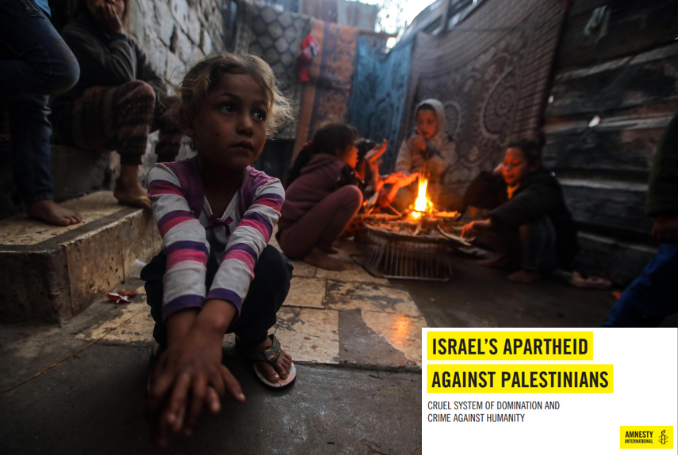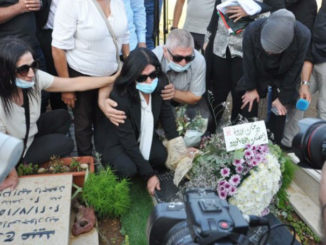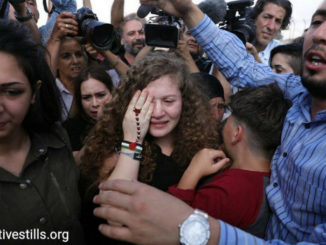
By Romana Rubeo 
On Tuesday, February 1, London-based international human rights group Amnesty International (AI) released an extraordinary report, which labels Israel an ‘apartheid state’. The report calls for Israel to be held accountable for its practices against Palestinians.
The 280-page document, entitled ‘Israel’s Apartheid Against Palestinians: Cruel System of Domination and Crime Against Humanity’, outlines how the Israeli state segregates and controls Palestinians in order to maintain Jewish hegemony.
Though to be fully appreciated, the AI document must be read in its entirety, below are the top ten points raised by the international human rights group.
1. What is Apartheid?
After defining “apartheid” as “a violation of public international law, a grave violation of internationally protected human rights and a crime against humanity under international criminal law”, Amnesty, in its report, describes Israel’s “intent to oppress and dominate Palestinians:
“Since its establishment in 1948, Israel has pursued an explicit policy of establishing and maintaining a Jewish demographic hegemony and maximizing its control over land to benefit Jewish Israelis while minimizing the number of Palestinians and restricting their rights and obstructing their ability to challenge this dispossession.”
2. Geographic Scope
According to Amnesty, the system of segregation “extended beyond the (so-called) Green Line to the West Bank and Gaza Strip, which (Israel) has occupied” in 1967.
“Today, all territories controlled by Israel continue to be administered with the purpose of benefiting Jewish Israelis to the detriment of Palestinians, while Palestinian refugees continue to be excluded.”
“Although Israel’s system of apartheid manifests itself in different ways in the various areas under its effective control,” the report reads, “it consistently has the same purpose of oppressing and dominating Palestinians for the benefit of Jewish Israelis, who are privileged under Israeli civil law regardless of where they reside.”
3. Treatment of Palestinians
Israel should be labeled an apartheid state because “Palestinians are treated by the Israeli state differently based on its consideration of them as having a racialized non-Jewish, Arab status”.
4. Territorial Fragmentation, Segregation, Jewish Settlements
Starting in 1948, Israel pursued a policy of territorial fragmentation and legal segregation, Amnesty said in its report.
“(Israel) chose to coerce Palestinians into enclaves within the State of Israel and, following their military occupation in 1967, the West Bank and Gaza Strip. They have appropriated the vast majority of Palestinians’ land and natural resources. They have introduced laws, policies and practices that systematically and cruelly discriminate against Palestinians, leaving them fragmented geographically and politically, in a constant state of fear and insecurity, and often impoverished.”
“Meanwhile, Israel’s leaders have opted to systemically privilege Jewish citizens in law and in practice through the distribution of land and resources, resulting in their relative wealth and well-being at the expense of Palestinians. They have steadily expanded Jewish settlements on occupied Palestinian territory in violation of international law,” the report adds.
5. Legal Segregation
Amnesty describes the way “Israel has used military rule as a key tool to establish its system of oppression and domination over Palestinians across both sides of the Green Line, applying it over different groups of Palestinians in Israel and the OPT almost continuously since 1948”.
“Israel maintains its system of fragmentation and segregation through different legal regimes that ensure the denial of nationality and status to Palestinians, violate their right to family unification and return to their country and their homes, and severely restrict freedom of movement based on legal status.”
6. Restrictions of Movement and Apartheid Wall
Amnesty denounces the closure system imposed on Palestinians within the Occupied Territories and between the OPT and Israel, “gradually subjecting millions of Palestinians who live in the West Bank, including East Jerusalem, and Gaza Strip to ever more stringent restrictions on movement based on their legal status. These restrictions are another tool through which Israel segregates Palestinians into separate enclaves, isolates them from each other and the world, and ultimately enforces its domination.”
Moreover, the report highlights how “the 700km fence/wall, which Israel continues building mostly illegally on Palestinian land inside the occupied West Bank, has isolated 38 Palestinian localities in the West Bank (…) and has trapped them in enclaves known as ‘seam zones’”.
7. Political Rights
According to Amnesty, “Israel’s version of democracy overwhelmingly privileges political participation by Jewish Israelis.”
“Limitations on the right of Palestinian citizens of Israel to participate in elections are accompanied by other infringements of their civil and political rights that limit the extent to which they can participate in the political and social life of Israel. This has included racialized policing of protests, mass arbitrary arrests and the use of unlawful force against protesters during demonstrations against Israeli repression in both Israel and the OPT.”
8. Dispossession of Palestinian Land
Amnesty illustrates how, since its creation on the ruins of Palestinian towns and villages, “the Israeli state has enforced massive and cruel land seizures to dispossess and exclude Palestinians from their land and homes.”
Suffice it to say, “in 1948, Jewish individuals and institutions owned around 6.5% of Mandate Palestine, while Palestinians owned about 90% of the privately owned land there. Within just over 70 years the situation has been reversed.”
Amnesty also mentions Israeli laws and regulations currently implemented by Israeli authorities to carry out demolitions of Palestinian property in East Jerusalem, including the Absentees’ Property Law of 1950 and the Administrative Matters Law.
“In Israel and East Jerusalem, (the Israeli government) transferred from the state to Jewish national organizations and institutions, many of which serve Jews only, while the legal title of the land remained in the state’s name.”
9. Crimes against Humanity
Amnesty’s report analyzes three major categories of crimes against humanity, that’s to say, the “inhuman and inhumane acts as proscribed, respectively, by the Apartheid Convention and the Rome Statute”.
First, it condemns the forcible transfer of Palestinians, explaining that, “since 1948, Israel has demolished tens of thousands of Palestinian homes and other properties across all areas under its jurisdiction and effective control.”
Second, the report addresses the issues of administrative detention, torture and other ill-treatment.
“Israel’s systematic use (of the administrative detention) against Palestinians indicates that it is used to persecute Palestinians, rather than as an extraordinary and selective security measure.”
The report also illustrates how “Israeli courts have admitted evidence obtained through torture of Palestinians, accepting the justification of ‘necessity’. Prompt, thorough and impartial investigations by Israeli authorities into allegations by Palestinians that they have been tortured are extremely rare, effectively giving state endorsement to the crime of torture.”
Third, Amnesty strongly condemns Israel’s unlawful killings and injuries, which were “perpetrated outside the context of armed conflict during Israeli law enforcement activities in the OPT, including during the suppression of protests, arrest raids, when enforcing travel and movement restrictions, and conducting house and search operations.”
10. Recommendations
Amnesty states in its report that “dismantling this cruel system of apartheid is essential for the millions of Palestinians who continue to live in Israel and the OPT, as well as for the return of Palestinian refugees who remain displaced in neighbouring countries”.
Also, it urges the need for “the international community to urgently and drastically change its approach to the Israeli-Palestinian conflict and recognize the full extent of the crimes that Israel perpetrates against the Palestinian people.”
Amnesty directly calls on “the USA, the European Union and its member states and the UK” to “recognize that Israel is committing the crime of apartheid and other international crimes, and use all political and diplomatic tools to ensure Israeli authorities implement the recommendations outlined in this report and review any cooperation and activities with Israel to ensure that these do not contribute to maintaining the system of apartheid”.
Finally, Amnesty calls on the International Criminal Court (ICC) “to consider the applicability of the crime against humanity of apartheid within its current formal investigation,” and on the United Nations Security Council to “impose targeted sanctions, such as asset freezes, against Israeli officials most implicated in the crime of apartheid, and a comprehensive arms embargo on Israel.”
(Read the full report here: Amnesty International – Apartheid Israel)
(The Palestine Chronicle)

– Romana Rubeo is an Italian writer and the managing editor of The Palestine Chronicle. Her articles appeared in many online newspapers and academic journals. She holds a Master’s Degree in Foreign Languages and Literature and specializes in audio-visual and journalism translation.








The video is well worth the watch time.